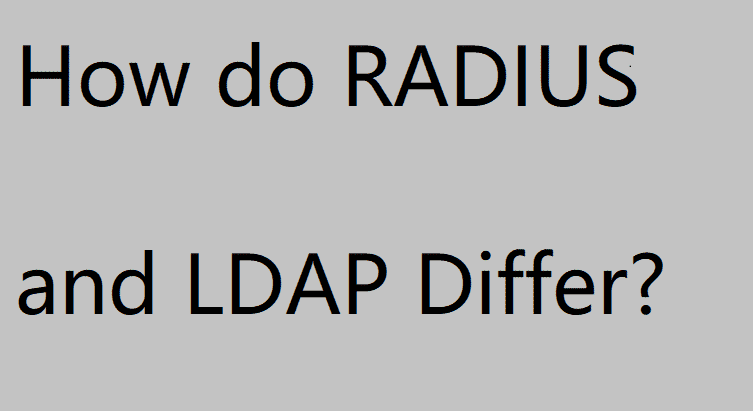LDAP and RADIUS are two popular protocols used for authentication and authorization. LDAP stands for Lightweight Directory Access Protocol while RADIUS stands Remote Authentication Dial-In User Service. Since the basic functionalities of both the protocols are similar, it is very difficult to decide which one to choose for your application. There are certain differences at the operational level which can give you the edge in decision making. First, let us understand both the protocols in details.
LDAP – With this protocol, you can search and modify directions in a network. In a typical LDAP server, there is an LDAP directory tree containing directories of users. LDAP clients can get information about the entries and modify the entries by contacting the server. These servers are replicated for faster access to the directories in a network. All the details for the users are stored in it along with authentication information. The network administrators will have full flexibility for implementing various types of services.
RADIUS – It is a widely used protocol for centralized authorization and authentication as well as accounting. The clients contact the server with credentials and with the access request message, the server sends access to accept/reject/challenge message in response. RADIUS has modern two-factor authentication. The accounting part is done through other additional message steps. There is support for more complex authentication for an administrator to implement as per requirement.
Differences –
There are various small differences in the operation of both the protocols. This leads to various security and traffic differences. For example, the way of interacting over the network is quite different as LDAP uses TCP while RADIUS uses UDP for reliable connection across the network. TCP’s connection is truly reliable, but the network overhead is more. UDP minimizes those network overheads, and the connection is not as reliable for TCP. If speed is your priority, RADIUS is a better option. LDAP requires multiple transactions between server and client. On the other hand, RADIUS uses cache mechanism for storing user information for faster delivery.
RADIUS packets lack encryption by default other than the one containing the password. Therefore, there is a chance of leakage of sensitive information, and hence, the administrations need additional security mechanisms. While in TCP protocol, encryption is applicable in all transfers.
On the other hand, LDAP does not support multifactor authentication yet. There are various enterprise level services available, but the resource requirement is extremely high. These services can use other protocols including RADIUS. That is why there are so many companies using LDAP and RADIUS in conjunction. In short, you can conclude that RADIUS may not provide a reliable connection, but the security level is higher. This is because the authentication part is not up to date and the authorization part is handled by LDAP, and it is rather outsourced to third-party.
Managing RADIUS is slightly difficult as with more functionalities, come more complexity. It can get a little confusing for the network administrators. This is probably because RADIUS uses multiple protocols for communication and the troubleshooting becomes difficult. Due to LDAP offering basic authentication with minimal hardware items and a clean and user-friendly interface, the maintenance burden is minimal, and there is no stress on the administrators.
In short, the basic functions of both the protocols are the same which is centralized authentication. LDAP is perfect for single sign-on services but lacks session accounting. It is easily encrypted, and it is extremely simple to set up and integrate with a network. RADIUS allows flexibility in its services, and it is applicable on all network services. But setting up could be time-consuming and not simple. LDAP is perfect for small applications where simple authentication is required. For complex and advanced authentication, RADIUS has no peers.
- Top 6 SEO Tools to Boost Your Business - January 18, 2024
- Top PHP interview questions and answers 2020 - July 7, 2020
- How to create a Whatsapp account using the Australian number? - June 28, 2020

